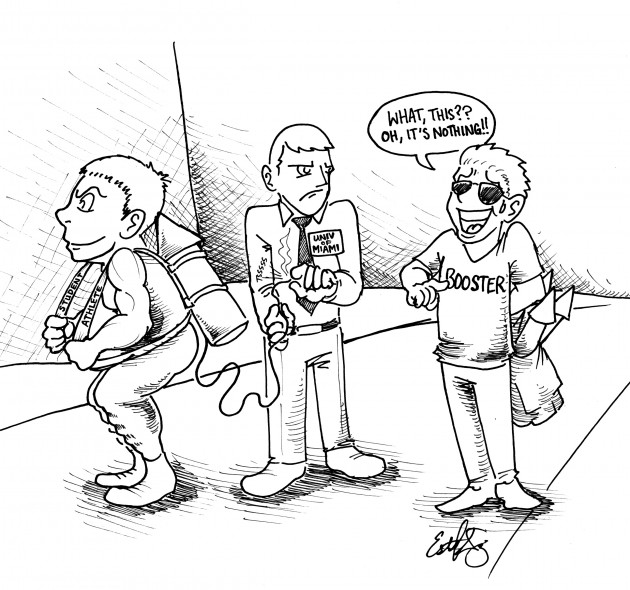
As of Jan. 16, the University of Miami will no longer allow boosters to provide occasional meals for student-athletes or host them at their homes.
The move comes after former Miami booster Nevin Shapiro told Yahoo Sports last August he provided extra benefits for 72 Hurricanes players from 2002 to 2010. The story led to an investigation by the NCAA and Miami self-imposing a bowl ban for the 2011 season.
While the effort by Miami to clean up its act should be applauded, the move should have come much sooner considering how prominent and harmful the violations were to the program and its student-athletes. Shouldn’t the compliance office have pounced on this issue from the beginning?
Again, Miami deserves applause, as the school is banning activities that are not technically violations under the NCAA. According to NCAA rules, athletes “may receive an occasional meal from a representative of athletics interests on infrequent and special occasions.” The NCAA also allows boosters to host events at their home.
So Miami has taken the initiative to go beyond the NCAA rules, but it took five months for them to set these new boundaries for boosters. This rule should have been in place immediately.
If Miami had put these rules in place immediately, not only would it have helped the problem, but it would help the university’s public image. Typically the public likes it when the fire is extinguished early and does not burn the whole building down. Many college football fans already have a negative image of “The U” due to the teams from the late 1990s which portrayed themselves as thugs.
Additionally, the NCAA has not ruled as to whether or not it will sanction Miami for the claims brought by Shapiro, and if it does decide to sanction Miami, to what extent. Miami has already tried to soften that blow with the self-imposed bowl ban – but that does not stop the NCAA. Universities under investigation in the past have tried punishing themselves and still received additional punishment from the NCAA.
Had Miami changed the rules for boosters sooner, it may have been a sign of good faith to the NCAA that the school is trying to move in the right direction, and the NCAA may have taken that into account in its sentencing. Granted, since the sanctions have still not been placed, Miami making the move now may still help.
Another question that must be raised is should the NCAA change its rules for boosters interacting with student-athletes? An argument can be made that allowing boosters to give meals and hosts athletes at their homes is a slippery slope to violations. Also, should a student-athlete be receiving this special treatment simply because he or she a prominent athlete?
On the other hand, a booster’s job is to support the university financially, and providing occasional meals is a way to do so that does not step too far out of the boundaries.
Ultimately, more stringently limiting contact between boosters and student-athletes should be something the NCAA considers, as Miami is not the first school to have issues with boosters having inappropriate contact with players. Hopefully Miami can get back on its feet, and “The U” can regain recognition for athletic success once again.






